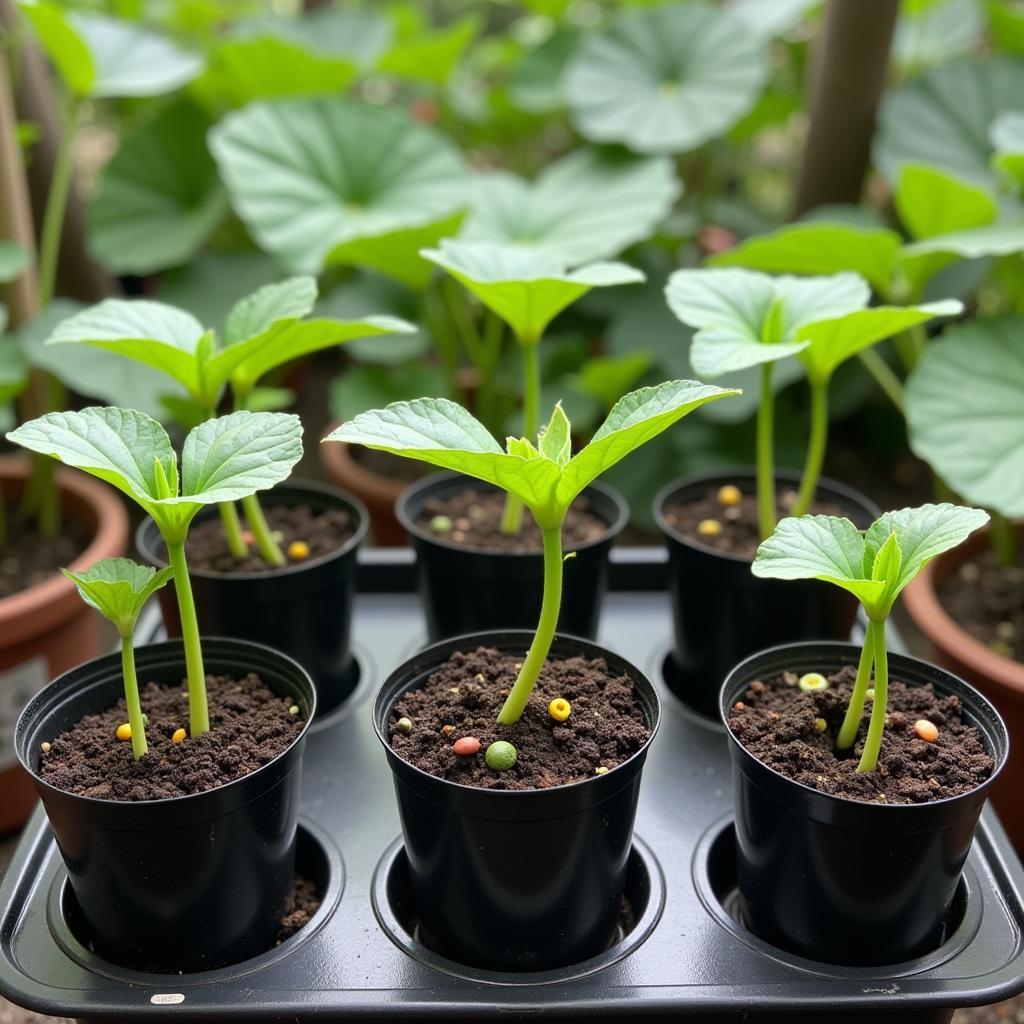African Horned Cucumber Seeds: A Guide to Growing This Unique Fruit
The African horned cucumber, also known as kiwano or jelly melon, is an unusual-looking fruit with a spiky, orange rind and a vibrant green, jelly-like flesh. While often enjoyed for its refreshing taste and versatility in the kitchen, did you know you can cultivate these exotic fruits from African Horned Cucumber Seeds? This comprehensive guide will delve into everything you need to know about growing this intriguing fruit from seed, from understanding its origins to enjoying its unique flavor in your own backyard.
 African Horned Cucumber Seeds
African Horned Cucumber Seeds
A Taste of Africa: Uncovering the Origins of the African Horned Cucumber
Native to Southern Africa, the African horned cucumber (Cucumis metuliferus) thrives in warm climates. While technically a fruit, it’s often enjoyed as a vegetable in salads, salsas, and even desserts. Its tart, slightly sweet flavor has been described as a cross between a cucumber and a kiwi, making it a unique and refreshing addition to various culinary creations.
African Horned Cucumber Seeds: Sowing the Seeds of Success
Cultivating your own African horned cucumbers from seed is a rewarding experience that allows you to enjoy the freshest, most flavorful fruits. Follow these steps to ensure your seeds flourish:
1. Selecting the Right Seeds
The first step to a bountiful harvest begins with choosing high-quality African horned cucumber seeds. You can source these seeds from reputable online retailers or local nurseries specializing in exotic fruits and vegetables.
2. Starting Seeds Indoors
African horned cucumbers prefer warm temperatures and plenty of sunlight. It’s best to start seeds indoors 4-6 weeks before the last expected frost in your region. This allows the seedlings to develop a strong root system before being transplanted outdoors.
- Use a seed-starting mix designed for melons or cucumbers.
- Plant seeds approximately ½ inch deep in individual pots or seed trays.
- Water gently and consistently, ensuring the soil remains moist but not waterlogged.
- Place the seed trays in a warm, sunny location, ideally with a consistent temperature of 70-80°F (21-27°C).
- Once seedlings emerge (usually within 7-10 days), provide them with plenty of direct sunlight or use grow lights to supplement natural light.
 African Horned Cucumber Seedlings
African Horned Cucumber Seedlings
3. Transplanting Seedlings Outdoors
Once the danger of frost has passed and the soil has warmed, it’s time to transplant your seedlings outdoors. Choose a sunny location with well-drained soil.
- Harden off your seedlings before transplanting by gradually introducing them to outdoor conditions. This process helps prevent transplant shock.
- Space plants about 2-3 feet apart to allow for their sprawling growth habit.
- Water deeply after transplanting and continue to provide regular irrigation throughout the growing season.
african cucumber health benefits
4. Providing Support for Growth
African horned cucumber plants are vigorous climbers and benefit from sturdy support. Install trellises, fences, or stakes to support the vines as they grow. This not only keeps the fruits off the ground, but also improves air circulation, reducing the risk of diseases.
5. Essential Care Tips
- Watering: Consistent watering is crucial, especially during dry spells. Water deeply at the base of the plant, avoiding wetting the leaves, to prevent fungal diseases.
- Fertilizing: Provide a balanced fertilizer every few weeks to support healthy growth and fruit production.
- Pest and Disease Control: Keep an eye out for common garden pests like aphids and cucumber beetles. Practice good garden hygiene to minimize disease pressure.
Harvesting the Fruits of Your Labor
African horned cucumbers are typically ready for harvest about 80-90 days after sowing seeds. The fruits are ripe when they turn a vibrant orange color and detach easily from the vine with a gentle twist.
[african horned cucumber australia](https://omenkamag.com/african horned cucumber australia/)
Savoring the Unique Flavor: Enjoying African Horned Cucumbers
Now that you’ve successfully cultivated your own African horned cucumbers, it’s time to enjoy their refreshing, tangy flavor.
- Eat them fresh: Slice them open and scoop out the jelly-like flesh for a refreshing snack.
- Add them to salads: Their unique taste and vibrant color make them a welcome addition to salads.
- Create refreshing drinks: Blend the flesh with water, lime juice, and honey for a unique and hydrating beverage.
- Experiment with pickles and preserves: Their tartness lends itself well to pickling or preserving.
Conclusion: Embark on Your African Horned Cucumber Growing Journey
Growing African horned cucumbers from seed is an exciting way to experience the joys of gardening and savor the taste of this exotic fruit. By following these steps and incorporating the provided tips, you can cultivate a thriving patch of these intriguing plants and enjoy a bountiful harvest of African horned cucumbers.
Frequently Asked Questions
1. Can I save seeds from my African horned cucumbers to plant next year?
Yes, you can collect seeds from ripe fruits to plant the following season. Allow the seeds to dry completely before storing them in a cool, dry place.
2. Are African horned cucumbers susceptible to any specific diseases?
Like most cucurbits, African horned cucumbers can be prone to powdery mildew and downy mildew. Ensure proper air circulation and avoid overhead watering to minimize disease pressure.
3. Can I grow African horned cucumbers in containers?
Yes, they can be grown in containers, but choose a large pot (at least 10 gallons) to accommodate their vigorous root system.
4. How long can I store African horned cucumbers?
Store them in a cool, dry place for up to two weeks or refrigerate them for extended freshness.
5. Where can I purchase African horned cucumber seeds?
Reputable online seed retailers and local nurseries specializing in exotic fruits and vegetables are great sources for high-quality seeds.
african horned cucumber nutrition
Need assistance with your African horned cucumber growing journey? Don’t hesitate to contact us. Call: +255768904061, Email: kaka.mag@gmail.com or visit us: Mbarali DC Mawindi, Kangaga, Tanzania. Our dedicated customer support team is available 24/7 to help you cultivate a thriving garden.


